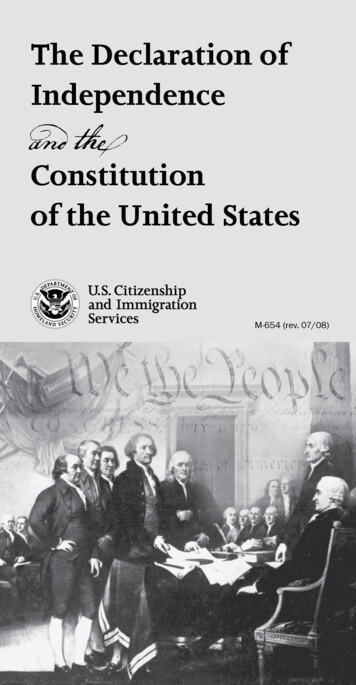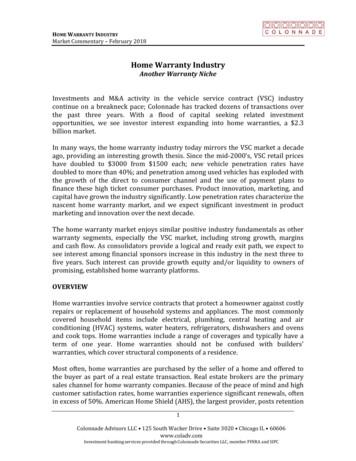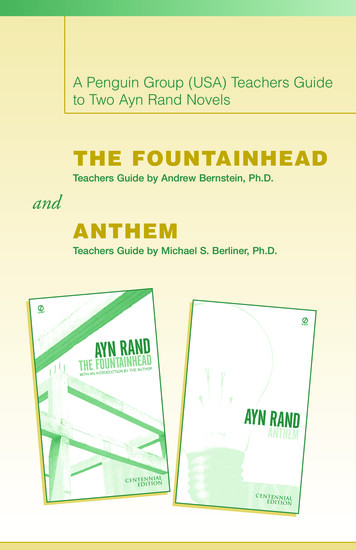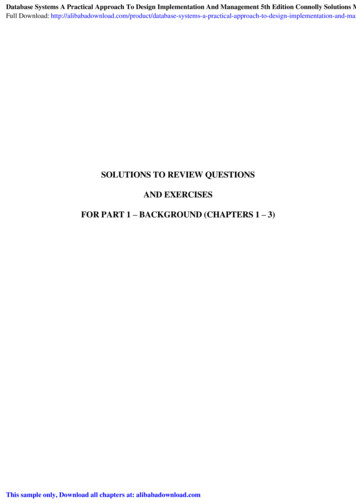
Transcription
The Declaration ofIndependence& theConstitutionof the United StatesM-654 (rev. 07/08)
The Declaration ofIndependence& theConstitutionof the United States
Message from the Director“The sacred rights of mankind are not to berummaged for, among old parchments, or mustyrecords.They are written, as with a sun beamin the whole volume of human nature, by thehand of the divinity itself; and can never beerased or obscured by mortal power.”— Alexander Hamilton, 1775“The basis of our political systems is theright of the people to make and to altertheir Constitutions of Government. But theConstitution which at any time exists, ‘tillchanged by an explicit and authentic act of thewhole People is sacredly obligatory upon all.”— George Washington, 1796“The Declaration of Independence.[is the]declaratory charter of our rights, and of therights of man.”— Thomas Jefferson, 1819The Declaration of Independence and theConstitution of the United States are the two mostimportant, and enduring documents in our Nation’shistory. It has been said that “the Declaration ofIndependence was the promise; the Constitutionwas the fulfillment.”More than 200 years ago, our FoundingFathers set out to establish a government basedon individual rights and the rule of law. TheDeclaration of Independence, which officiallybroke all political ties between the Americancolonies and Great Britain, set forth the ideas andprinciples behind a just and fair government, andthe Constitution outlined how this governmentwould function. Our founding documents havewithstood the test of time, rising to the challengeeach time they were called upon.Make no mistake, we have been presented witha timeless framework for self-government, but inorder to preserve this wonderful gift, we must holdthese principles close to our hearts. I encourage youto read and understand these documents. I promiseyou will be nothing short of inspired.DirectorU.S. Citizenship and Immigration Services
The DECLARATION OF InDEPEnDeNCEAction of Second Continental Congress, July 4, 1776The Unanimous Declaration of the thirteen united States of AmericaWhen in the Course of human Events, itbecomes necessary for one People to dissolve thePolitical Bands which have connected them withanother, and to assume among the Powers of theEarth, the separate and equal Station to which theLaws of Nature and of Nature’s God entitle them,a decent Respect to the Opinions of Mankindrequires that they should declare the causes whichimpel them to the Separation.We hold these Truths to be self-evident,that all Men are created equal, that they areendowed by their Creator with certain unalienableRights, that among these are Life, Liberty, andthe pursuit of Happiness—That to secure theseRights, Governments are instituted among Men,deriving their just Powers from the Consent of theGoverned, that whenever any Form of Governmentbecomes destructive of these Ends, it is the Right ofthe People to alter or to abolish it, and to institutenew Government, laying its Foundation on suchPrinciples, and organizing its Powers in suchForm, as to them shall seem most likely to effecttheir Safety and Happiness. Prudence, indeed, willdictate that Governments long established shouldnot be changed for light and transient Causes;and accordingly all Experience hath shewn, thatMankind are more disposed to suffer, while Evils aresufferable, than to right themselves by abolishingthe Forms to which they are accustomed. But when
a long Train of Abuses and Usurpations, pursuinginvariably the same Object, evinces a design to reducethem under absolute Despotism, it is their Right, itis their Duty, to throw off such Government, and toprovide new Guards for their future Security. Suchhas been the patient Sufferance of these Colonies;and such is now the Necessity which constrainsthem to alter their former Systems of Government.The History of the present King of Great-Britainis a History of repeated Injuries and Usurpations,all having in direct Object the Establishment of anabsolute Tyranny over these States. To prove this, letFacts be submitted to a candid World.He has refused his Assent to Laws, the mostwholesome and necessary for the public Good.He has forbidden his Governors to pass Lawsof immediate and pressing Importance, unlesssuspended in their Operation till his Assent shouldbe obtained; and when so suspended, he has utterlyneglected to attend to them.He has refused to pass other Laws for theAccommodation of large Districts of People,unless those People would relinquish the Rightof Representation in the Legislature, a Rightinestimable to them, and formidable to Tyrantsonly.He has called together Legislative Bodies atPlaces unusual, uncomfortable, and distant fromthe Depository of their public Records, for the solePurpose of fatiguing them into Compliance withhis Measures.He has dissolved Representative Housesrepeatedly, for opposing with manly Firmness hisInvasions on the Rights of the People. He has refused for a long Time, after suchDissolutions, to cause others to be elected;whereby the Legislative Powers, incapable ofAnnihilation, have returned to the People at largefor their exercise; the State remaining in the meantime exposed to all the Dangers of Invasion fromwithout, and Convulsions within.He has endeavoured to prevent the Populationof these States; for that Purpose obstructing theLaws for Naturalization of Foreigners; refusing topass others to encourage their Migrations hither,and raising the Conditions of new Appropriationsof Lands.He has obstructed the Administration of Justice,by refusing his Assent to Laws for establishingJudiciary Powers.He has made Judges dependent on his Willalone, for the Tenure of their Offices, and theAmount and Payment of their Salaries.He has erected a Multitude of new Offices,and sent hither Swarms of Officers to harrass ourPeople, and eat out their Substance.He has kept among us, in Times of Peace,Standing Armies, without the consent of ourLegislatures.He has affected to render the Militaryindependent of and superior to the Civil Power.He has combined with others to subject usto a Jurisdiction foreign to our Constitution, andunacknowledged by our Laws; giving his Assent totheir Acts of pretended Legislation:For quartering large Bodies of Armed Troopsamong us:
For protecting them, by a mock Trial, fromPunishment for any Murders which they shouldcommit on the Inhabitants of these States:For cutting off our Trade with all Parts of theWorld:For imposing Taxes on us without ourConsent:For depriving us, in many Cases, of the Benefitsof Trial by Jury:For transporting us beyond Seas to be tried forpretended Offences:For abolishing the free System of EnglishLaws in a neighbouring Province, establishingtherein an arbitrary Government, and enlarging itsBoundaries, so as to render it at once an Exampleand fit Instrument for introducing the sameabsolute Rule into these Colonies:For taking away our Charters, abolishing ourmost valuable Laws, and altering fundamentallythe Forms of our Governments:For suspending our own Legislatures, anddeclaring themselves invested with Power tolegislate for us in all Cases whatsoever.He has abdicated Government here, bydeclaring us out of his Protection and waging Waragainst us.He has plundered our Seas, ravaged our Coasts,burnt our Towns, and destroyed the Lives of ourPeople.He is, at this Time, transporting large Armiesof foreign Mercenaries to compleat the Works ofDeath, Desolation, and Tyranny, already begunwith circumstances of Cruelty and Perfidy, scarcely paralleled in the most barbarous Ages, and totallyunworthy the Head of a civilized Nation.He has constrained our fellow Citizens takenCaptive on the high Seas to bear Arms againsttheir Country, to become the Executioners of theirFriends and Brethren, or to fall themselves by theirHands.He has excited domestic Insurrectionsamongst us, and has endeavoured to bring on theInhabitants of our Frontiers, the merciless IndianSavages, whose known Rule of Warfare, is anundistinguished Destruction of all Ages, Sexes andConditions.In every stage of these Oppressions we havePetitioned for Redress in the most humble Terms:Our repeated Petitions have been answered only byrepeated Injury. A Prince, whose Character is thusmarked by every act which may define a Tyrant, isunfit to be the Ruler of a free People.Nor have we been wanting in Attentions toour British Brethren. We have warned them fromTime to Time of Attempts by their Legislature toextend an unwarrantable Jurisdiction over us. Wehave reminded them of the Circumstances of ourEmigration and Settlement here. We have appealedto their native Justice and Magnanimity, and wehave conjured them by the Ties of our commonKindred to disavow these Usurpations, which,would inevitably interrupt our Connections andCorrespondence. They too have been deaf to theVoice of Justice and of Consanguinity. We must,therefore, acquiesce in the Necessity, whichdenounces our Separation, and hold them, as we
hold the rest of Mankind, Enemies in War, in Peace,Friends.We, therefore, the Representatives of the unitedStates of America, in General Congress, Assembled,appealing to the Supreme Judge of the World forthe Rectitude of our Intentions, do, in the Name,and by Authority of the good People of theseColonies, solemnly Publish and Declare, That theseUnited Colonies are, and of Right ought to be Freeand Independent States; that they are absolved fromall Allegiance to the British Crown, and that allpolitical Connection between them and the State ofGreat-Britain, is and ought to be totally dissolved;and that as Free and Independent States, they havefull Power to levy War, conclude Peace, contractAlliances, establish Commerce, and to do all otherActs and Things which Independent States may ofright do. —And for the support of this Declaration,with a firm Reliance on the Protection of divineProvidence, we mutually pledge to each other ourLives, our Fortunes, and our sacred Honor.Signed by ORDER and in BEHALF of the CONGRESS,John Hancock, PresidentAttest.Charles Thomson, SecretarySigners of the Declaration of IndependenceGeorgia:Button GwinnettLyman HallGeorge WaltonNorth Carolina:William HooperJoseph HewesJohn PennSouth Carolina:Edward RutledgeThomas Heyward, Jr.Thomas Lynch, Jr.Arthur MiddletonMassachusetts:Samuel AdamsJohn AdamsRobert Treat PaineElbridge GerryJohn HancockMaryland:Samuel ChaseWilliam PacaThomas StoneCharles Carroll of CarrolltonVirginia:George WytheRichard Henry LeeThomas JeffersonBenjamin HarrisonThomas Nelson, Jr.Francis Lightfoot LeeCarter BraxtonPennsylvania:Robert MorrisBenjamin Rush Benjamin FranklinJohn MortonGeorge ClymerJames SmithGeorge TaylorJames WilsonGeorge RossDelaware:Caesar RodneyGeorge ReadThomas McKeanNew York:William FloydPhilip LivingstonFrancis LewisLewis MorrisNew Jersey:Richard StocktonJohn WitherspoonFrancis HopkinsonJohn HartAbraham ClarkNew Hampshire:Josiah BartlettMatthew ThorntonWilliam WhippleRhode Island:Stephen HopkinsWilliam ElleryConnecticut:Roger ShermanSamuel HuntingtonWilliam WilliamsOliver Wolcott
The Constitutionof the United States of AmericaWe the People of the United States, in Order to forma more perfect Union, establish Justice, insuredomestic Tranquility, provide for the commondefence, promote the general Welfare, and securethe Blessings of Liberty to ourselves and ourPosterity, do ordain and establish this Constitutionfor the United States of America.Article. I.Section. 1. All legislative Powers hereingranted shall be vested in a Congress of the UnitedStates, which shall consist of a Senate and House ofRepresentatives.Section. 2. The House of Representatives shallbe composed of Members chosen every secondYear by the People of the several States, and theElectors in each State shall have the Qualificationsrequisite for Electors of the most numerous Branchof the State Legislature.No Person shall be a Representative who shallnot have attained to the Age of twenty five Years,and been seven Years a Citizen of the United States,and who shall not, when elected, be an Inhabitantof that State in which he shall be chosen.[Representatives and direct Taxes shall beapportioned among the several States which maybe included within this Union, according to theirrespective Numbers, which shall be determinedby adding to the whole Number of free Persons,including those bound to Service for a Term of
Years, and excluding Indians not taxed, three fifthsof all other Persons.] The actual Enumerationshall be made within three Years after the firstMeeting of the Congress of the United States, andwithin every subsequent Term of ten Years, in suchManner as they shall by Law direct. The numberof Representatives shall not exceed one for everythirty Thousand, but each State shall have at Leastone Representative; and until such enumerationshall be made, the State of New Hampshire shallbe entitled to chuse three, Massachusetts eight,Rhode-Island and Providence Plantations one,Connecticut five, New-York six, New Jersey four,Pennsylvania eight, Delaware one, Maryland six,Virginia ten, North Carolina five, South Carolinafive, and Georgia three.When vacancies happen in the Representationfrom any State, the Executive Authority thereofshall issue Writs of Election to fill such Vacancies.The House of Representatives shall chuse theirSpeaker and other Officers; and shall have the solePower of Impeachment.Section. 3. The Senate of the United Statesshall be composed of two Senators from each State,[chosen by the Legislature thereof,] for six Years;and each Senator shall have one Vote.Immediately after they shall be assembled inConsequence of the first Election, they shall bedivided as equally as may be into three Classes.The Seats of the Senators of the first Class shallbe vacated at the Expiration of the second Year, ofChanged by section 2 of the Fourteenth Amendment.Changed by the Seventeenth Amendment.the second Class at the Expiration of the fourthYear, and of the third Class at the Expiration ofthe sixth Year, so that one third may be chosenevery second Year; [and if Vacancies happen byResignation, or otherwise, during the Recess ofthe Legislature of any State, the Executive thereofmay make temporary Appointments until the nextMeeting of the Legislature, which shall then fillsuch Vacancies.] No Person shall be a Senator who shall nothave attained to the Age of thirty Years, and beennine Years a Citizen of the United States, and whoshall not, when elected, be an Inhabitant of thatState for which he shall be chosen.The Vice President of the United States shallbe President of the Senate, but shall have no Vote,unless they be equally divided.The Senate shall chuse their other Officers,and also a President pro tempore, in the Absenceof the Vice President, or when he shall exercise theOffice of President of the United States.The Senate shall have the sole Power to try allImpeachments. When sitting for that Purpose, theyshall be on Oath or Affirmation. When the Presidentof the United States is tried, the Chief Justice shallpreside: And no Person shall be convicted withoutthe Concurrence of two thirds of the Memberspresent.Judgment in Cases of Impeachment shallnot extend further than to removal from Office,and disqualification to hold and enjoy any Officeof honor, Trust or Profit under the United States: 10Changed by the Seventeenth Amendment. 11
but the Party convicted shall nevertheless be liableand subject to Indictment, Trial, Judgment andPunishment, according to Law.Section. 4. The Times, Places and Manner ofholding Elections for Senators and Representatives,shall be prescribed in each State by the Legislaturethereof; but the Congress may at any time by Lawmake or alter such Regulations, except as to thePlaces of chusing Senators.The Congress shall assemble at least once inevery Year, and such Meeting shall be [on the firstMonday in December,] unless they shall by Lawappoint a different Day.Section. 5. Each House shall be the Judge ofthe Elections, Returns and Qualifications of its ownMembers, and a Majority of each shall constitute aQuorum to do Business; but a smaller Number mayadjourn from day to day, and may be authorized tocompel the Attendance of absent Members, in suchManner, and under such Penalties as each Housemay provide.Each House may determine the Rules of itsProceedings, punish its Members for disorderlyBehaviour, and, with the Concurrence of twothirds, expel a Member.Each House shall keep a Journal of itsProceedings, and from time to time publishthe same, excepting such Parts as may in theirJudgment require Secrecy; and the Yeas and Naysof the Members of either House on any questionshall, at the Desire of one fifth of those Present, beentered on the Journal.Changed by section 2 of the Twentieth Amendment. 12Neither House, during the Session of Congress,shall, without the Consent of the other, adjourn formore than three days, nor to any other Place thanthat in which the two Houses shall be sitting.Section. 6. The Senators and Representativesshall receive a Compensation for their Services, tobe ascertained by Law, and paid out of the Treasuryof the United States. They shall in all Cases, exceptTreason, Felony and Breach of the Peace, beprivileged from Arrest during their Attendanceat the Session of their respective Houses, and ingoing to and returning from the same; and for anySpeech or Debate in either House, they shall not bequestioned in any other Place.No Senator or Representative shall, during theTime for which he was elected, be appointed to anycivil Office under the Authority of the United States,which shall have been created, or the Emolumentswhereof shall have been encreased during suchtime; and no Person holding any Office under theUnited States, shall be a Member of either Houseduring his Continuance in Office.Section. 7. All Bills for raising Revenue shalloriginate in the House of Representatives; but theSenate may propose or concur with Amendmentsas on other Bills.Every Bill which shall have passed the Houseof Representatives and the Senate, shall, before itbecome a Law, be presented to the President ofthe United States; If he approve he shall sign it,but if not he shall return it, with his Objectionsto that House in which it shall have originated,who shall enter the Objections at large on their13
Journal, and proceed to reconsider it. If after suchReconsideration two thirds of that House shallagree to pass the Bill, it shall be sent, together withthe Objections, to the other House, by which itshall likewise be reconsidered, and if approved bytwo thirds of that House, it shall become a Law. Butin all such Cases the Votes of both Houses shall bedetermined by yeas and Nays, and the Names ofthe Persons voting for and against the Bill shall beentered on the Journal of each House respectively.If any Bill shall not be returned by the Presidentwithin ten Days (Sundays excepted) after it shallhave been presented to him, the Same shall be aLaw, in like Manner as if he had signed it, unlessthe Congress by their Adjournment prevent itsReturn, in which Case it shall not be a Law.Every Order, Resolution, or Vote to whichthe Concurrence of the Senate and House ofRepresentatives may be necessary (except on aquestion of Adjournment) shall be presented tothe President of the United States; and before theSame shall take Effect, shall be approved by him, orbeing disapproved by him, shall be repassed by twothirds of the Senate and House of Representatives,according to the Rules and Limitations prescribedin the Case of a Bill.Section. 8. The Congress shall have Power Tolay and collect Taxes, Duties, Imposts and Excises,to pay the Debts and provide for the commonDefence and general Welfare of the United States;but all Duties, Imposts and Excises shall be uniformthroughout the United States;14To borrow Money on the credit of the UnitedStates;To regulate Commerce with foreign Nations,and among the several States, and with the IndianTribes;To establish an uniform Rule of Naturalization,and uniform Laws on the subject of Bankruptciesthroughout the United States;To coin Money, regulate the Value thereof, andof foreign Coin, and fix the Standard of Weightsand Measures;To provide for the Punishment of counterfeitingthe Securities and current Coin of the UnitedStates;To establish Post Offices and post Roads;To promote the Progress of Science and usefulArts, by securing for limited Times to Authors andInventors the exclusive Right to their respectiveWritings and Discoveries;To constitute Tribunals inferior to the supremeCourt;To define and punish Piracies and Feloniescommitted on the high Seas, and Offences againstthe Law of Nations;To declare War, grant Letters of Marque andReprisal, and make Rules concerning Captures onLand and Water;To raise and support Armies, but noAppropriation of Money to that Use shall be for alonger Term than two Years;To provide and maintain a Navy;To make Rules for the Government andRegulation of the land and naval Forces;15
To provide for calling forth the Militia to executethe Laws of the Union, suppress Insurrections andrepel Invasions;To provide for organizing, arming, anddisciplining, the Militia, and for governing suchPart of them as may be employed in the Service ofthe United States, reserving to the States respectively,the Appointment of the Officers, and the Authorityof training the Militia according to the disciplineprescribed by Congress;To exercise exclusive Legislation in all Caseswhatsoever, over such District (not exceedingten Miles square) as may, by Cession of particularStates, and the Acceptance of Congress, become theSeat of the Government of the United States, andto exercise like Authority over all Places purchasedby the Consent of the Legislature of the State inwhich the Same shall be, for the Erection of Forts,Magazines, Arsenals, dock-Yards, and other needfulBuildings;—AndTo make all Laws which shall be necessaryand proper for carrying into Execution theforegoing Powers, and all other Powers vested bythis Constitution in the Government of the UnitedStates, or in any Department or Officer thereof.Section. 9. The Migration or Importationof such Persons as any of the States now existingshall think proper to admit, shall not be prohibitedby the Congress prior to the Year one thousandeight hundred and eight, but a Tax or duty may beimposed on such Importation, not exceeding tendollars for each Person.The Privilege of the Writ of Habeas Corpusshall not be suspended, unless when in Cases ofRebellion or Invasion the public Safety may requireit.No Bill of Attainder or ex post facto Law shallbe passed.No Capitation, or other direct, Tax shall be laid,unless in Proportion to the Census or enumerationherein before directed to be taken. No Tax or Duty shall be laid on Articlesexported from any State.No Preference shall be given by any Regulationof Commerce or Revenue to the Ports of one Stateover those of another: nor shall Vessels bound to,or from, one State, be obliged to enter, clear, or payDuties in another.No Money shall be drawn from the Treasury,but in Consequence of Appropriations made byLaw; and a regular Statement and Account of theReceipts and Expenditures of all public Moneyshall be published from time to time.No Title of Nobility shall be granted by theUnited States: And no Person holding any Officeof Profit or Trust under them, shall, without theConsent of the Congress, accept of any present,Emolument, Office, or Title, of any kind whatever,from any King, Prince, or foreign State.Section. 10. No State shall enter into any Treaty,Alliance, or Confederation; grant Letters of Marqueand Reprisal; coin Money; emit Bills of Credit;make any Thing but gold and silver Coin a Tenderin Payment of Debts; pass any Bill of Attainder, exSee the Sixteenth Amendment. 1617
post facto Law, or Law impairing the Obligation ofContracts, or grant any Title of Nobility.No State shall, without the Consent of theCongress, lay any Imposts or Duties on Imports orExports, except what may be absolutely necessaryfor executing it’s inspection Laws: and the netProduce of all Duties and Imposts, laid by any Stateon Imports or Exports, shall be for the Use of theTreasury of the United States; and all such Lawsshall be subject to the Revision and Controul ofthe Congress.No State shall, without the Consent ofCongress, lay any Duty of Tonnage, keep Troops,or Ships of War in time of Peace, enter into anyAgreement or Compact with another State, or witha foreign Power, or engage in War, unless actuallyinvaded, or in such imminent Danger as will notadmit of delay.Article. II.Section. 1. The executive Power shall be vestedin a President of the United States of America. Heshall hold his Office during the Term of four Years,and, together with the Vice President, chosen forthe same Term, be elected, as follows:Each State shall appoint, in such Manner asthe Legislature thereof may direct, a Number ofElectors, equal to the whole Number of Senators andRepresentatives to which the State may be entitledin the Congress: but no Senator or Representative,or Person holding an Office of Trust or Profit underthe United States, shall be appointed an Elector.[The Electors shall meet in their respectiveStates, and vote by Ballot for two Persons, of whom18one at least shall not be an Inhabitant of the sameState with themselves. And they shall make a Listof all the Persons voted for, and of the Numberof Votes for each; which List they shall sign andcertify, and transmit sealed to the Seat of theGovernment of the United States, directed to thePresident of the Senate. The President of the Senateshall, in the Presence of the Senate and House ofRepresentatives, open all the Certificates, and theVotes shall then be counted. The Person having thegreatest Number of Votes shall be the President, ifsuch Number be a Majority of the whole Numberof Electors appointed; and if there be more thanone who have such Majority, and have an equalNumber of Votes, then the House of Representativesshall immediately chuse by Ballot one of them forPresident; and if no Person have a Majority, thenfrom the five highest on the List the said House shallin like Manner chuse the President. But in chusingthe President, the Votes shall be taken by States,the Representation from each State having oneVote; A quorum for this Purpose shall consist of aMember or Members from two thirds of the States,and a Majority of all the States shall be necessaryto a Choice. In every Case, after the Choice of thePresident, the Person having the greatest Numberof Votes of the Electors shall be the Vice President.But if there should remain two or more who haveequal Votes, the Senate shall chuse from them byBallot the Vice President.] The Congress may determine the Time ofchusing the Electors, and the Day on which theyChanged by the Twelfth Amendment. 19
shall give their Votes; which Day shall be the samethroughout the United States.No Person except a natural born Citizen, ora Citizen of the United States, at the time of theAdoption of this Constitution, shall be eligible tothe Office of President; neither shall any Person beeligible to that Office who shall not have attainedto the Age of thirty five Years, and been fourteenYears a Resident within the United States.[In Case of the Removal of the President fromOffice, or of his Death, Resignation, or Inability todischarge the Powers and Duties of the said Office,the Same shall devolve on the Vice President, andthe Congress may by Law provide for the Caseof Removal, Death, Resignation or Inability, bothof the President and Vice President, declaringwhat Officer shall then act as President, and suchOfficer shall act accordingly, until the Disability beremoved, or a President shall be elected.] The President shall, at stated Times, receive forhis Services, a Compensation, which shall neitherbe increased nor diminished during the Period forwhich he shall have been elected, and he shall notreceive within that Period any other Emolumentfrom the United States, or any of them.Before he enter on the Execution of his Office,he shall take the following Oath or Affirmation:—”Ido solemnly swear (or affirm) that I will faithfullyexecute the Office of President of the United States,and will to the best of my Ability, preserve, protectand defend the Constitution of the United States.”Section. 2. The President shall be Commanderin Chief of the Army and Navy of the United States,and of the Militia of the several States, when calledinto the actual Service of the United States; he mayrequire the Opinion, in writing, of the principalOfficer in each of the executive Departments, uponany Subject relating to the Duties of their respectiveOffices, and he shall have Power to grant Reprievesand Pardons for Offences against the United States,except in Cases of Impeachment.He shall have Power, by and with the Adviceand Consent of the Senate, to make Treaties,provided two thirds of the Senators presentconcur; and he shall nominate, and by and withthe Advice and Consent of the Senate, shall appointAmbassadors, other public Ministers and Consuls,Judges of the supreme Court, and all other Officersof the United States, whose Appointments are notherein otherwise provided for, and which shall beestablished by Law: but the Congress may by Lawvest the Appointment of such inferior Officers, asthey think proper, in the President alone, in theCourts of Law, or in the Heads of Departments.The President shall have Power to fill up allVacancies that may happen during the Recess ofthe Senate, by granting Commissions which shallexpire at the End of their next Session.Section. 3. He shall from time to time giveto the Congress Information of the State of theUnion, and recommend to their Considerationsuch Measures as he shall judge necessary andexpedient; he may, on extraordinary Occasions,convene both Houses, or either of them, and inChanged by the Twenty-Fifth Amendment. 2021
Case of Disagreement
full Power to levy War, conclude Peace, contract Alliances, establish Commerce, and to do all other Acts and Things which Independent States may of right do. —And for the support of this Declaration, with a firm Reliance on the Protection of divine Providence, we mutually pledge to










